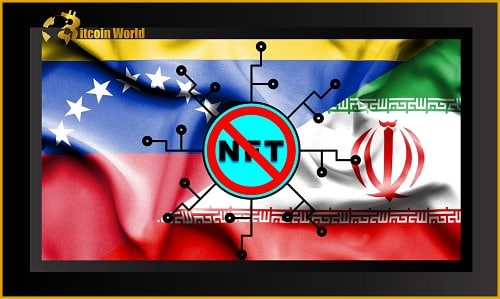Is your favorite NFT marketplace suddenly inaccessible? If you’re in Iran or Venezuela, the answer might be a resounding yes. Recent reports have surfaced about OpenSea, a leading NFT platform, terminating accounts linked to Iranian IP addresses. This move isn’t isolated; it’s a ripple effect of the escalating global discussions around international sanctions and the ongoing conflict in Ukraine. As pressure mounts on major cryptocurrency exchanges to restrict access for Russian entities, the entire crypto ecosystem is feeling the tremors and reassessing their compliance mechanisms. It’s not just exchanges feeling the heat; even NFT platforms like OpenSea are adapting to the shifting sands of digital asset regulation.
Iranians Blocked By OpenSea: What’s Happening?
Starting Friday, Iranian users found themselves locked out of OpenSea. Collectors and artists voiced their frustration on social media, particularly Twitter, expressing surprise and disappointment at the sudden restrictions. OpenSea has since confirmed these actions, stating they are indeed blocking users from sanctioned regions. According to an official statement, OpenSea clarified that:
“Access to our services – including purchasing, selling, or transferring NFTs on OpenSea – is prohibited for individuals and locations on the United States’ sanctions list.”
An OpenSea spokesperson further elaborated to CoinDesk, emphasizing a strict stance:
“We have a zero-tolerance policy for sanctioned individuals or entities, as well as those residing in sanctioned nations.”
This move comes amidst increasing pressure on cryptocurrency exchanges. The White House National Security Council and the US Treasury Department have reportedly issued directives to major crypto exchanges this week, urging them to prevent Russians from using cryptocurrencies to evade sanctions.
The directive aims to ensure that “Russians do not use cryptocurrency as a method of escape,” highlighting the growing concern about digital assets being used to circumvent financial restrictions. In the OpenSea case, multiple Iranian users have reported account closures, with some acknowledging they were accessing the platform from within Iran. Artist Nima Leo Photos, for instance, announced the inaccessibility of their NFT collection on the platform.
Venezuela Feels the Impact Too
It’s not just Iran. Venezuelan users are also experiencing restricted access to crucial crypto infrastructure. Arman, an OpenSea user from Venezuela, encountered an “Error 404” when attempting to access the marketplace. Arefeh Norouzii reported the unexplained takedown of their verified account on Friday. Adding to the disruption, access to Infura, a vital developer tool for decentralized applications (dApps) including trading platforms and games, has also been blocked in Venezuela.
This Infura block has a cascading effect, rendering MetaMask, a widely used cryptocurrency wallet and interface for interacting with dApps, unusable for many in Venezuela. MetaMask alluded to these issues in a blog post, mentioning that users in sanctioned locations might encounter error messages when trying to access the wallet.
Key Takeaways: Why are these actions significant?
- Sanctions are Expanding into the Crypto Space: Traditionally focused on banks and financial institutions, sanctions are now directly impacting cryptocurrency platforms and their users.
- NFTs are Not Immune: The OpenSea case demonstrates that NFT marketplaces, often perceived as decentralized and outside traditional finance, are also subject to regulatory pressures and sanctions compliance.
- Geopolitical Events Drive Crypto Policy: The Russia-Ukraine conflict is a major catalyst, accelerating the scrutiny and regulation of cryptocurrency in the context of international sanctions.
- Impact on Users in Sanctioned Countries: Legitimate crypto users in countries under sanctions are caught in the crossfire, losing access to platforms and services.
- Decentralization vs. Compliance: The core principle of decentralization in crypto is being challenged by the need for compliance with national and international regulations.
What does this mean for the future of crypto?
The actions taken by OpenSea and Infura highlight a critical juncture for the cryptocurrency industry. As governments worldwide increasingly focus on regulating digital assets, crypto platforms are forced to navigate a complex landscape of compliance. This situation raises several important questions:
- Will other platforms follow suit? It’s highly likely that other NFT marketplaces and crypto services will implement similar restrictions to comply with sanctions.
- How will decentralization be maintained? The challenge lies in balancing the decentralized ethos of crypto with the need to adhere to centralized regulations.
- What are the alternatives for users in sanctioned regions? Users may explore decentralized exchanges (DEXs) and VPNs, but these options also come with risks and limitations.
- Will sanctions drive innovation in censorship-resistant technologies? The pressure of sanctions could spur development of more robust decentralized and privacy-focused crypto solutions.
In Conclusion: A Shifting Landscape
The blocking of Iranian and Venezuelan users by OpenSea and Infura signals a significant shift in the crypto landscape. The industry is moving towards greater regulation and compliance, driven by geopolitical events and government pressures. While this may be seen as a necessary step towards mainstream adoption by some, it also raises concerns about censorship, financial inclusion, and the original ideals of a decentralized, permissionless financial system. For crypto users, especially those in regions subject to international sanctions, navigating this evolving landscape will require increased awareness, adaptability, and a deeper understanding of the interplay between crypto and global politics.
Related Posts – Ferrari joins the NFT universe through a collaboration with a Swiss…
Disclaimer: The information provided is not trading advice, Bitcoinworld.co.in holds no liability for any investments made based on the information provided on this page. We strongly recommend independent research and/or consultation with a qualified professional before making any investment decisions.




